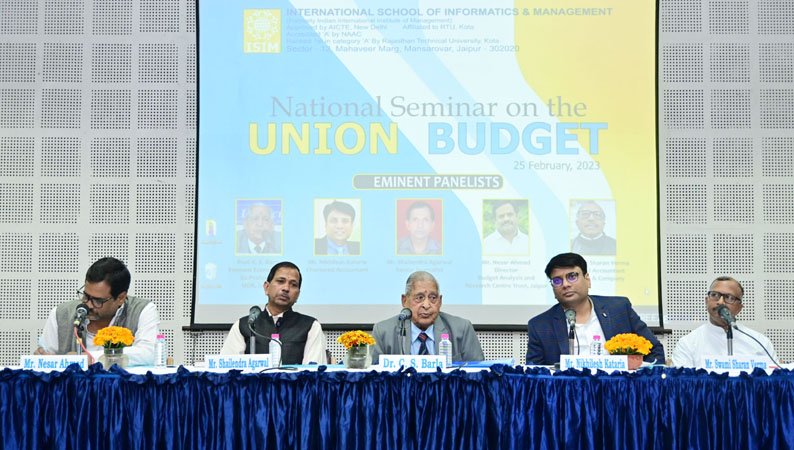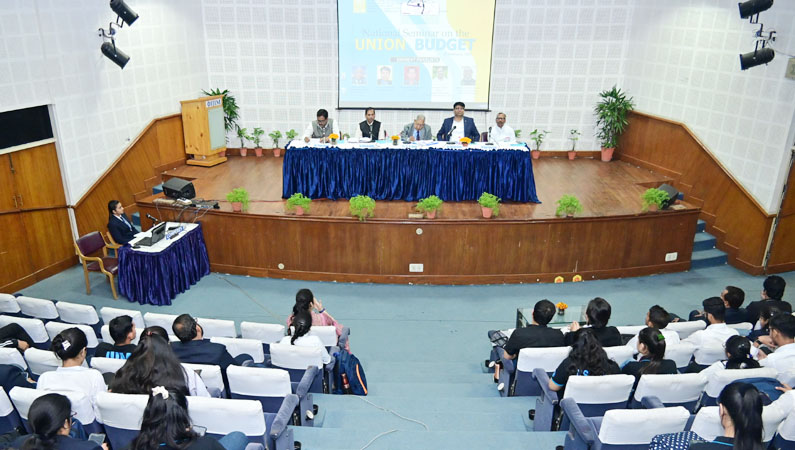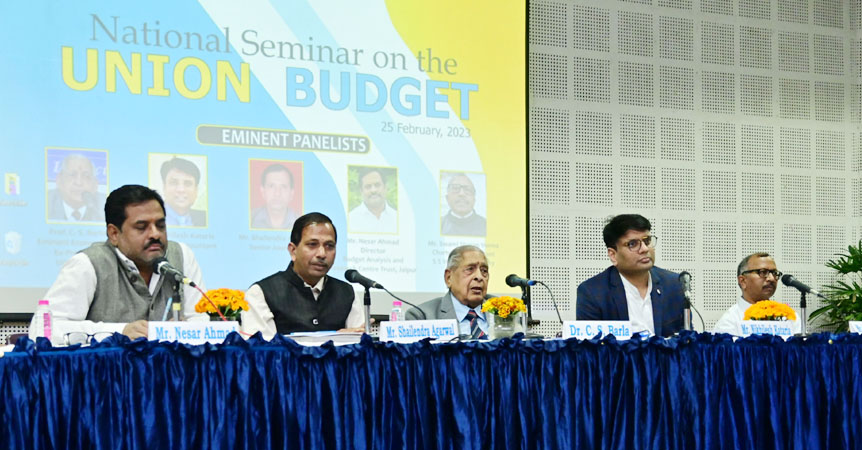-
For Admission Apply Now
-
Online Fee MBA I MCA
-
 Call Now ! +0141-2781154
Call Now ! +0141-2781154 -
 Email Now iiim@icfia.org
Email Now iiim@icfia.org



The institute organized National Seminar on the Union Budget-2023 on February 25th, 202. Dr. C. S. Barla, Eminent Economist and Ex. Prof., HOD Economics, University of Rajasthan, Mr. Nikhilesh Kataria, Charted Accountant, Mr. Shailendra Agrawal, Senior Journalist, Rajasthan Patrika, Mr. Nesar Ahmad, Director, Budget Analysis and Research Centre Trust, Jaipur, and Mr. Swami Sharan Verma, Charted Accountant, SS Verma & Company were the eminent speakers for the seminar. The resource persons presented their views on the recent budget that was introduced in the parliament on February 1st, by honourable finance minister Ms. Nirmala Sitharaman.
The Seminar apprised the students with the nuance of Indian budgetary policy. The session provides a wonderful opportunity to the students to explore the benefits and limitations of the recent budget from various viewpoints, as well as to understand the financial impact on the country's micro and macroeconomic elements.
Dr. C S barla started his deliberations in a very lucid way and quoted that earlier tax was seen with a perspective of ‘villain’ but now it has been replaced with the ‘hero’ perspective due to its power of collecting funds to boost overall growth of the economy.
Mr. Nikhilesh Kataria, informed students about the uniqueness of the budget. He shared that Rebate limit of Personal Income Tax has been increased to Rs. 7 lakh from the current Rs. 5 lakh in the new tax regime, conversion of gold into electronic gold receipt and vice versa not to be treated as capital gain, Increasing tax exemption limit to 25 lakhs, standard deduction of Rs. 50,000 to salaried individual, and deduction from family pension up to Rs. 15,000, in the new tax regime etc. He appreciated the constant endeavour of the Income Tax Department to improve Tax Payers Services by making compliance easy and smooth.
Mr. Shailendra Agarwal shared his perspective by appreciating the intentions of the Government with the beautiful quote ‘Sabka Sath aur Sabka Vikas’. He asked audience to see the impact of the budget by dividing it into three categories : Primary (agriculture), Secondary and Tertiary for creating a deeper understanding of it. He also commented that it is not just about making budgetary policy, but implementation by Government calls upon an action oriented approach. He shared his opinion that to bring about increase in effective administration in the nation, management skills are necessary. He opined that an improvement in health infrastructure, Education & Government Support can play an important role in making India a leading destination of Human Capital.
Mr. Nesar Ahmed apprised audience with the fact that Government provided ration to 80 crore people during covid19. According to him, through budgetary policy, a common man gets an option to invest in right avenues. He said there is surge in inflation but it is time to also to analyse the positive outcomes of effective budgetary policies due to which poverty is reducing every year. He shared that Allocation for livelihood and other schemes have seen 14% cuts in Rural Development, the latent impact on rural India needs a deeper analysis.
Mr. Swami Sharan Verma advised audience to be wise before referring to any world reports or indices depicting ranking of India on various parameters. A noticeable trend in recent years has been the decline of India’s rankings on a number of global indices, specifically in opinion-based indices that deal with subjective issues such as democracy, press freedom etc. He said that India has a room for further improvement in Education Sector. The trends need to be seen in a holistic perspective for both positive and negative indices.
With his concluding views about the budget, Mr. Barla acquainted students with the nitty-gritty of the financial environment and also spoke about the challenges that are yet to be faced by the new Finance Minister of India.